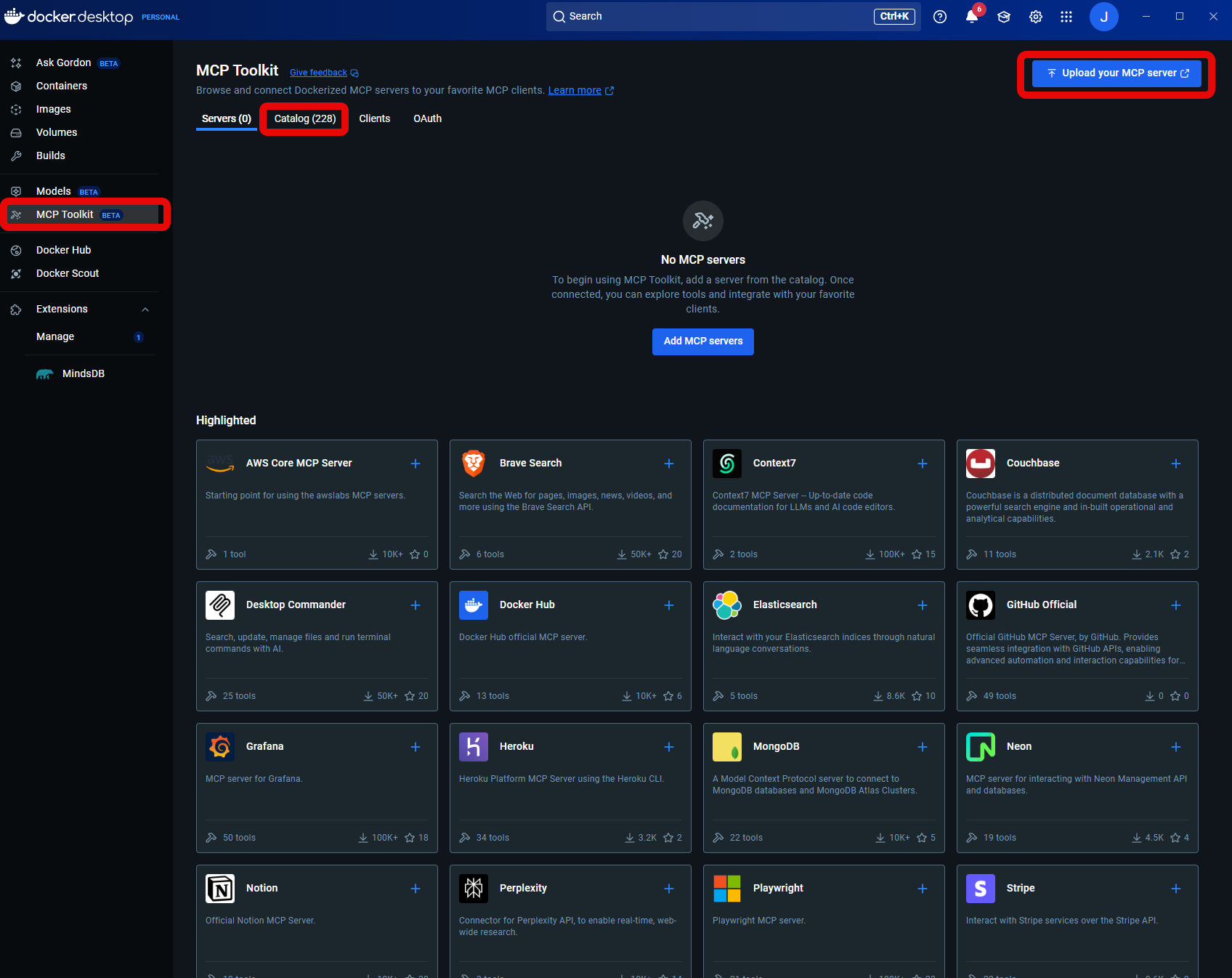Docker’s MCP Toolkit and Gateway are packaging AI services as containers and exposing them through a consolidated gateway providing an easy and secure way to connect your AI agents to diverse tools. This approach removes the chaos of juggling multiple tools, letting teams focus more on building and deploying, less on managing integrations.

How It All Started: Containers Meet AI
Docker observed that modern AI tools share the best traits of containers: modularity, isolation, and orchestration. With the rise of the Model Context Protocol (MCP), Docker’s infrastructure was already primed to support these innovations. By wrapping AI services in containers, Docker ensures that agents operate with consistency and simplicity from development through production, providing “controlled hands” for every task.
What Makes the MCP Toolkit Essential
The MCP Toolkit addresses two main challenges: discovering and orchestrating AI tools. It provides a curated catalog of MCP servers, such as YouTube transcript generators or custom search services, all packaged as container images. This lets users launch services instantly, eliminating setup headaches and environment conflicts. The toolkit also presents a single, unified interface, making it easy to browse and interact with tools via one endpoint.
Quick Start: Building Your AI Stack
- Select desired servers from the Docker MCP Catalog using Docker Desktop or CLI.
- Start the MCP Gateway and link your AI client.
- Input secrets or complete OAuth authentication as needed.
- Filter available tools into a custom profile for your client.
- Capture and version your setup with Compose for easy scaling and collaboration.
The MCP Gateway: Your Orchestration Hub
The MCP Gateway is the orchestrator at the heart of the toolkit. It decides which MCP servers are available to which clients and manages access securely. As both a process and an open-source project, the gateway allows you to expose both local and remote tools, manage OAuth authentication, and handle secrets through one streamlined entry point. Clients such as Claude simply connect, gaining instant access to approved tools without touching the underlying infrastructure.
Client Experience Simplified
With the gateway running, connecting your AI client is effortless. The gateway reveals only authorized tools, spinning up containers dynamically for each session. This minimizes the attack surface and reduces operational complexity while ensuring clients see exactly what’s relevant to them.
First things first: if you want the official overview and how-tos, start with the Docker MCP Catalog and Toolkit.
Security Built Into Every Layer
Security is foundational to the MCP strategy. Each container image undergoes provenance verification using Docker Scout, ensuring authenticity and integrity with supply-chain checks and SBOM validation. Credentials and secrets are strictly scoped, mounted only at runtime and managed centrally, while OAuth flows are handled securely, keeping sensitive data isolated. This dual secret management covers both local and remote servers and is fully integrated with Docker Desktop and CLI.
Customization and Flexibility for Teams
With a growing catalog of tools, customization is vital. The gateway lets you define exactly which servers, tools, and resources each client can see. Profiles can be versioned with your codebase using Docker Compose, making team workflows repeatable and auditable. Multiple gateways can run with unique configurations, allowing for tailored environments across projects or teams.
From Local to Global: Scaling Made Easy
Docker Compose forms the backbone of the deployment process, defining both the gateway and tool servers as services. This ensures your setup is fully reproducible and portable, whether running locally or in the cloud. With integrations for platforms like Google Cloud Run and expanding Azure support, scaling is just a command away. Swapping models, adding tools, or moving between environments becomes seamless and efficient.
Why Teams Adopt the MCP Toolkit and Gateway
- Instant onboarding: No more environment conflicts—everything is containerized and ready to deploy.
- Robust security: Automated checks and scoped secrets reduce risk and enhance compliance.
- Unified workflow: Consistent processes from local dev to cloud scaling mean fewer errors and faster progress.
Final Thoughts: The Future of AI Agent Workflows
By combining Docker’s container technology with the MCP Toolkit and Gateway, teams can build, deploy, and secure AI agent stacks with unprecedented efficiency. The unified, security-first approach means less time spent on integration and more time on innovation. To get started, explore the Docker MCP Catalog and experience the next evolution in AI-powered workflows.
Get Started with Help From An Expert
Thanks for reading. This article highlights a major challenge in modern tech: securely integrating powerful tools. Just as Docker is streamlining AI agent workflows, I help businesses streamline their entire data and automation stack. My focus is on giving you powerful, custom-built tools without forcing you to send your sensitive data to a third-party "black box."
I specialize in building secure, powerful automation and business intelligence solutions that run on your own infrastructure. Whether you're all-in on a major cloud platform like AWS, GCP, or Azure, or running analytics on Snowflake and Databricks, I build custom solutions that fit your exact needs. Book a free, confidential consultation to take control of your data.

Streamlining AI Agent Workflows: How Docker’s MCP Toolkit and Gateway Transform Integration